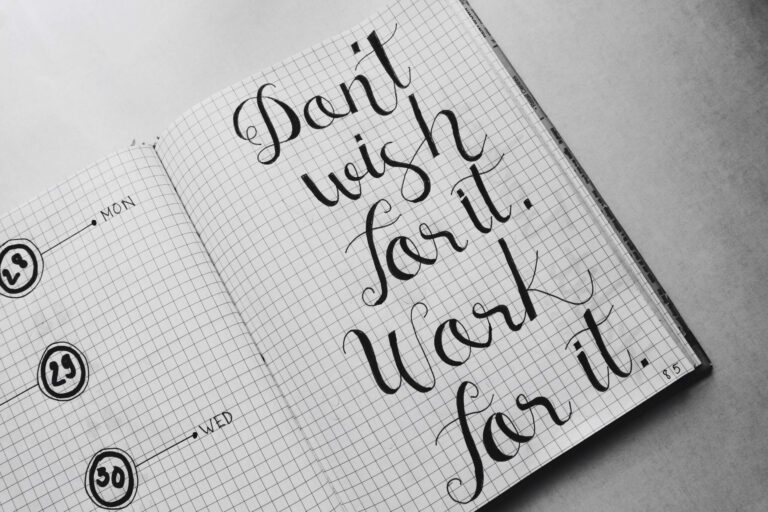Learning how to create a routine is more relevant today than ever before. In a constantly changing world and exposed to steadily growing demands, we’re looking for ways to use our time and energy optimally. Routines can be the key to doing that, and in this blog post, you’ll find out everything you need to know about them.
What Actually Is a Routine?
Before we explore the world of routines, it’s critical to understand what a routine is and how it works. A routine is much more than a habit or a regular action. It’s the framework that structures our everyday lives and makes them easier.
Imagine a routine like a firm foundation upon which you build your life. It consists of a sequence of actions or activities that are regularly repeated, whether daily, weekly, or in another set time frame. A routine can be as simple as brushing your teeth in the morning or as complex as a weekly exercise plan. But they all have one thing in common: they structure our lives and make our everyday lives easier.
Routines are the invisible threads that interweave our days. They’re the things we do automatically, without thinking much about it. And therein exactly lies their power: routines enable us to save our limited mental energy for more important decisions and tasks.
But how exactly do you develop routines that enrich your life and help you make progress? Before we dive deeper into that question, let’s examine how long it takes to develop a routine and what patience and endurance are necessary.
How Long Does it Take to Develop a Routine?
“Rome wasn’t built in a day”—this wisdom applies to routine development, too. Incorporating a new habit into daily life takes time, patience, and especially endurance.
The general assumption is that establishing a new habit takes about 21 to 66 days. This timeframe, however, can vary widely, depending on factors such as the complexity of the routine, your motivation, and your lifestyle.
The initial phase can often be the biggest challenge. In the first days or weeks, it may be easy to feel excited about your new routine, but then doubts can surface, making it difficult to motivate yourself anew each day.
The good news is that there are strategies and methods that can help you accelerate this process and increase your chance of success. We’ll discuss these methods of routine development later in this article.
For now, it’s important to understand that it’s normal to experience setbacks. It doesn’t mean you’ve failed; only you’re human. Learning how to create a routine requires endurance and the readiness to get back up when you happen to fall.
Methods of Routine Development
Now that we know what a routine is and how long it can take to establish one, let’s look into some tried and tested methods of routine development. Here are some approaches that can help you:
The Two-Minute Rule
When a task takes less than two minutes, do it right away. This will help prevent small tasks from collecting and overwhelming you.
Daily Planning
Set clear goals for the day and plan when you’ll complete certain tasks. This will help you structure your day and set priorities.
Habit Tracking
Use apps or journals to track your progress in developing new routines. This gives you a feeling of fulfillment and motivation, and you can keep track of your progress.
Reward Systems
Reward yourself when you’ve followed your routines. This can motivate you to continue working on your habits. For example, you can set certain milestones, and when you’ve reached those, you buy or treat yourself to something specific.
Social Support
Share your goals and your progress with friends or family. They can give you encouraging feedback and keep you on course.
The Pros and Cons of Routines
Routines aren’t all sunshine and rainbows. They have pros and cons. Let’s have a look at them.
Pros of Routines
- Efficiency: Routines help you save time and do tasks more quickly.
- Stress Reduction: They create structure and reduce uncertainty, which can help reduce stress.
- Self-Management: Routines foster self-organization and self-control.
- Health: Healthy habits can be incorporated more easily into everyday life.
Cons of Routines
- Boredom: Too much routine can lead to boredom and monotony.
- Inflexibility: Rigid routines can cause problems if unexpected events occur.
- Lack of Creativity: They can limit the capacity for spontaneous innovation.
- Danger of Stagnation: Holding too fast to the same routines can result in not continuing to develop.
10 Strategies for How to Create a Routine
These ten tried-and-true strategies will help you successfully develop routines:
- Start Small
Start with small, achievable changes. Instead of planning one hour of exercise daily, begin with ten minutes. - Set Clear Goals
Define clear goals for your routines. This helps you maintain your focus. - Create Reminders
Use reminders to recall your planned activities. This could be an app, a Post-It, or an alarm clock. - Form Habits
Repeat your activities regularly to form habits. The more often you do something, the more it becomes routine. - Use Rewards
Reward yourself when you’ve kept to your routines. This can motivate you to stay the course. - Schedule Breaks
It’s also important to schedule breaks into your routines to avoid burnout. - Seek Social Support
Share your goals with friends or family who can support you. - Adjust Your Routines
Be flexible and adjust your routines when your life circumstances change. - Make it a Priority
Put your routines on the priority list and adhere to them. - Develop Self-Discipline
Work on your self-control to resist temptations and to complete your routines.
Conclusion
Learning how to create a routine can be a life-changing experience. Routines help bring structure and efficiency to your life. Keep in mind that it takes time and patience to develop habits. Be flexible and find the routines that best match your lifestyle. Overall, routines can help you be more stress-free and productive.
FAQs
Yes, that is possible, but it requires a certain level of planning and organization. To avoid overexertion, it’s recommended not to aim for too many routines all at once.
Setbacks are normal. The important thing is not to give up. Analyze what went wrong and adapt your strategy.
There aren’t any universally correct routines since they depend heavily on individual goals and needs. What works for one person might not necessarily be appropriate for another person.
The best time for routines depends on your lifestyle. Some people prefer mornings, and others prefer evenings. Experiment to find out which time works best for you.
Yes, routines are important for children, too, since they offer structure and stability. Parents can help foster healthy habits by introducing routines appropriate for kids.





